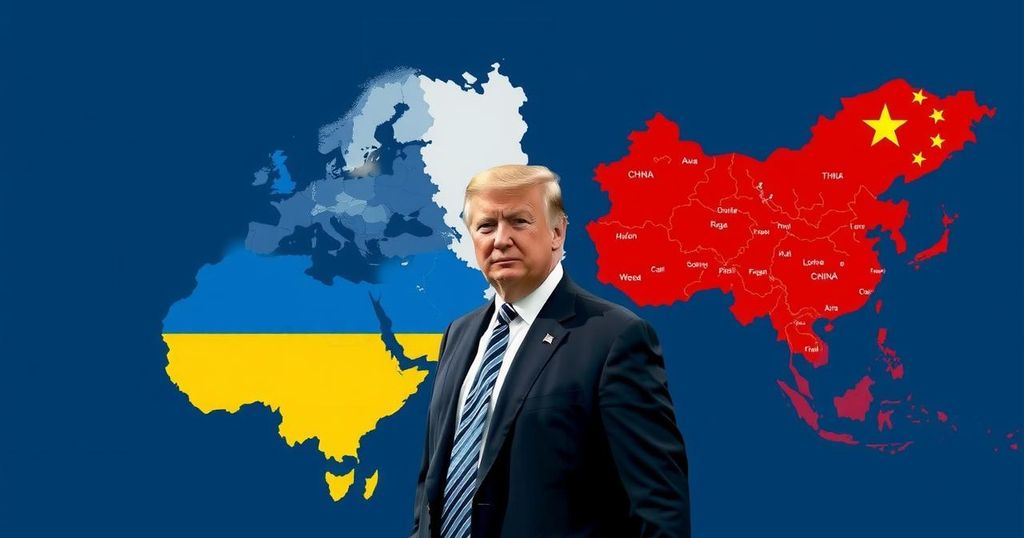Implications of Trump’s Victory for U.S. Foreign Policy in Ukraine, the Middle East, and China
Donald Trump’s return to the White House could reshape U.S. foreign policy significantly, emphasizing non-interventionism and protectionism. His strategies regarding Ukraine may seek quick resolutions while potentially compromising NATO stability. In the Middle East, he aims for peace while navigating complex relations, particularly with Israel and Hamas. Trump’s posture towards China might intensify economic confrontation and strategic tensions. Such shifts could disrupt established alliances and influence global security.
Donald Trump’s reinstatement as President of the United States will likely introduce substantial changes to the country’s foreign policy, particularly amid ongoing global conflicts. His campaign has emphasized principles of non-interventionism and protectionism, encapsulated in the slogan “America First.” This indicates a potential departure from established foreign policy norms, particularly in response to the crises affecting Ukraine, the Middle East, and China. With respect to Russia and Ukraine, Trump has suggested he could resolve the conflict swiftly, though he has not detailed how this might occur. A paper from former national security advisors proposes that continued U.S. military support for Ukraine should hinge upon Ukraine engaging in peace talks with Russia, with possibilities of delaying Ukraine’s NATO accession to facilitate negotiations. This perspective has faced criticism, especially from Trump’s opponents, who argue it compromises European security. In the Middle East, Trump has promised to restore peace, although his strategies remain vague. He has blamed the current crisis on President Biden’s approach, asserting that his previous policies would have deterred Hamas. Trump’s administration previously took hardline stances against Iran and adopted strong pro-Israel measures, which have left the Palestinian situation precarious and marginalized. Moving forward, Trump will have to balance support for Israel with a diplomatic solution in Gaza amidst his unpredictable approach. Concerning China, Trump has also indicated a shift from Biden’s policies. His administration labeled China as a strategic threat, introduced tariffs, and disrupted trade relations. Trump’s rhetoric suggests a return to a more aggressive stance, stating he would consider imposing severe economic penalties on China should tensions escalate over Taiwan. His complex relationship with global leaders will be crucial in determining how he navigates international relations moving forward. Overall, Trump’s victory signifies a pivotal moment for U.S. foreign policy, heralding potential unrest in established alliances and relationships. This new direction will be watched closely as it could have far-reaching consequences for global security and diplomatic relations.
Donald Trump’s foreign policy approach, characterized by a focus on ‘America First,’ raises substantial implications for international relations, particularly concerning areas embroiled in conflict like Ukraine and the Middle East, as well as dealing with strategic competitor China. Trump’s campaign rhetoric and past presidency indicate potential shifts towards non-interventionism in foreign conflicts and a priority on national interests over international alliances. The geopolitical landscape is poised for significant changes depending on how Trump reconciles his past governing decisions with new challenges he faces.
In conclusion, Donald Trump’s return to the presidency presents a potential inflection point for U.S. foreign policy. His approaches to Ukraine, the Middle East, and China suggest a focus on non-interventionism and protectionism, likely reshaping long-standing alliances and strategies. The consequences of these approaches, particularly regarding international security dynamics and crises, will warrant close observation as his administration unfolds, raising questions about the future diplomatic landscape.
Original Source: www.bbc.com




Post Comment